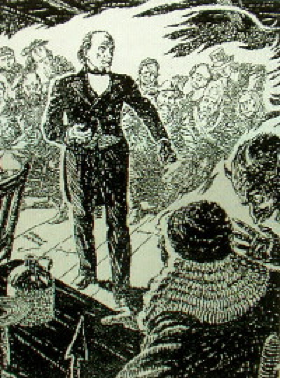Stephen Vincent Benet wrote a short story which was made into a movie in 1941 entitled “All for the Money.” The story was about a down-on-his-luck New Hampshire farmer who makes a contract with the devil in exchange for seven years of prosperity. In this story the devil is referred to as Mr. Scratch, a term often used in the 1850’s. When Mr. Scratch comes back in seven years to collect the farmer’s soul, Daniel Webster, lawyer and hero of the common man, challenges the contract. A judge and jury hear the arguments and render a verdict in favor of the farmer.
In 1971, Pulitzer Prize winner Archibald MacLeish wrote a three scene play using Benet’s story line. His play was called “Scratch” and touched on Daniel Webster’s efforts as a Senator in Congress to save the Union from a bloody civil war by proposing the Fugitive Slave Law.

Lawyer Daniel Webster before the Judge and Jury
where the Devil is both prosecutor and
plaintive against the farmer.
WEBSTER. You suggest, sir that I have changed. I have not changed my mind about slavery. I detest slavery. I regard slavery as a great moral and political evil.
SCRATCH. Back in the old dim days before you saw the light you had a dearer cause. Liberty, you used to say, and Union.
WEBSTER. Not a dearer cause: a single cause. Liberty and Union, one and inseparable, now and forever. I have preserved the peace. A peace which would preserve the hope by which alone the Union can survive.
In Scene two the farmer, Mr. Stone, asks Mr. Scratch for an extension of one more year to his contract. His request is denied.
MR. STONE. Then I’ll break it. I’ll get a lawyer and I’ll break it. There never was a contract drawn a lawyer couldn’t break. I’ll get the best. I’ll get Daniel Webster.
SCRATCH. But Daniel Webster is now Secretary of State to Mr. Fillmore.
MR. STONE. He’s my friend. He’s next door in Massachusetts.
In Scene three Mr. Webster confronts the devil and demands that the farmer’s contract be presented to an American judge and jury for foreclosure. The trial proceeds.
SCRATCH. No question. He admits the transaction. Confirms the debt is due and payable.
WEBSTER. Due yes. Payable is for the jury.
SCRATCH. What do you mean? You yourself have told your client that he sold his soul. Something, you once believed, that no American would do!
WEBSTER. Something one American, alas, has done.
SCRATCH. One American! Multitudes of them. And for the same bait – affluence – gratification. There was even one who sold his country’s soul! Ever hear of that one Mr. Webster? Sold it for peace, he said to preserve the Union! Took back his country’s promise to mankind for a few years’ peace – for a spell of prosperity. A promise that “all men have a right to Liberty!” But if a black man tried to use it he was still a slave – worse than a slave – a fugitive slave. It would keep the peace, you said, preserve the Union. Oh, yes. It preserved the Union Mr. Webster, but the country lost its soul.
As we read today’s newspapers we learn of yet another corporate executive who has squandered the company’s assets for his personal gain. We are reminded of the story of The Devil and Daniel Webster and wonder if the Devil is still collecting souls in exchange for wealth
